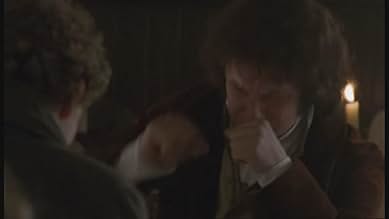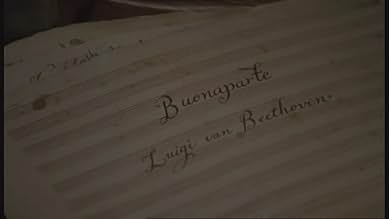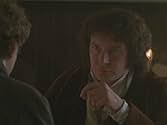Aggiungi una trama nella tua linguaOn June 9, 1804, Ludwig van Beethoven and his pupil Ries assemble a group of musicians to give the first performance of his Third Symphony, 'Bonaparte', to his patron Prince Lobkowitz and hi... Leggi tuttoOn June 9, 1804, Ludwig van Beethoven and his pupil Ries assemble a group of musicians to give the first performance of his Third Symphony, 'Bonaparte', to his patron Prince Lobkowitz and his guests, including hypercritical Count Dietrichstein, in Vienna. The piece provokes polit... Leggi tuttoOn June 9, 1804, Ludwig van Beethoven and his pupil Ries assemble a group of musicians to give the first performance of his Third Symphony, 'Bonaparte', to his patron Prince Lobkowitz and his guests, including hypercritical Count Dietrichstein, in Vienna. The piece provokes political arguments among players and audience as to whether Bonaparte is a tyrant, or, as Beet... Leggi tutto
- Regia
- Sceneggiatura
- Star
Recensioni in evidenza
"Eroica" is the best film about Beethoven that I have seen. OK, I've only seen three others, one of which was made in the 70s and I can't remember the name of that one. The other two were "Immortal Beloved" which was good, and "Copying Beethoven" which was horrendous. What attracted me to this movie was the clever direction and how it was made watchable despite the entire work being played throughout. When I say "despite", don't get me wrong, I'm a composer and I loved the music, but to be able to base an entire film around the complete performance (OK then, a rehearsal) of a particularly long work whilst simultaneously retaining visual and cinematic interest is a tricky task, and the director rose to the challenge magnificently. Ian Hart was convincing (unlike Ed Harris's comically over-acted portrayal, although his makeup was very good) and one of a very professional cast indeed. Isn't Fenella Woolgar gorgeous? Such a sexy nose! And so to the music. What was interesting was the fact that although Elliot Gardiner's soundtrack was obviously not that of which we see, it WAS played on period instruments. The biggest clue being when hearing the valveless horns playing the few notes that were not to be found within the harmonic series (on an Eb crook) sounding a bit flatulent. It also helps to know that John Elliot Gardiner is really hot on period instruments. I personally prefer modern orchestral instruments, but nothing can be taken away from the superb performance by this ensemble. Also the synchronisation must have been extremely tricky because all the musicians in shot were actually playing the music together, whilst acting simultaneously (they would have had to, to gurn their faces like they did as if the music was something completely new, which it so obviously was).
But what really made the movie work was the silent reaction to the music of the surrounding gentry and servants. It really helped to bring tears to my eyes.
A fabulous two hours of my time spent. Heartily recommended!!!
The events of Beethoven's life seem compressed and shoveled into the 90 minutes of the film. We see how he deals with large issues like Napeoleonic politics, patronage, love, and hearing loss, as well as smaller issues like arranging music and the most efficient means of belittling his assistant.
What I found fascinating was being able to see how the characters of the period responded to the music as it was being played. I have a distant knowledge of Beethoven's works, and while they are certainly powerful and turbulent, I lack the context of the music of the era. Seeing the patrons react to various passages of the music (which to my untrained ear just sounds pretty) and hearing them comment on the work as it progressed was for me highly illuminating.
What a thrill it would be to be able to walk around an orchestra as it plays! That would be the ultimate in surround sound! I was jealous of the characters as they mingled around the players, who from what I can tell were using period-correct instruments.
Although it's true that that first read-through was probably pretty rough.
Here is a short quotation from Ries via Thayer, which shows how well the filmmakers did their homework:
"...Here it happened that Beethoven, who was directing (the Eroica) himself, in the second part of the first Allegro where the music is pursued for so many measures in half-notes against the beat, threw the orchestra off in such a way that a new beginning had to be made." In the first Allegro occurs a mischievous whim (bose Laune) of Beethoven's for the first horn; in the second part, several measures before the theme recurs in its entirety, Beethoven has the horn suggest it (the theme: LS) at a place where the two violins are still holding a second chord (the violins are suggesting a Bb7 chord -- the *dominant* of Eb Major, whereas the horn is playing the theme (a simple arpeggio) in Eb Major, a harmony which sounded quite "wrong" to 1803 ears!: LS). To one unfamiliar with the score this must always sound as if the horn player made a miscount and entered at the wrong place. At the first rehearsal of the symphony, __which was horrible__, but at which the horn player made his entry correctly, I stood beside Beethoven, and, thinking that a blunder had been made I said: 'Can't the damned hornist count" -- it sounds infamously false!' I think I came pretty close to receiving a box on the ear. (Much more dramatic to come *more* than "pretty close"!: LS) Beethoven did not forgive the slip for a long time."
Thayer goes on to describe yet another rehearsal which Lobkowitz arranged for another prince, Louis Ferdinand of Prussia:
"To give him (Louis Ferdinand: LS) a surprise, the new, and of course, to him utterly unknown symphony, was played to the Prince, who 'listened to it with tense attention which grew with every movement.' At the close he proved his admiration by requesting the favor of an immediate repetition; and, after an hour's pause, as his stay was too limited to admit of another concert, a second. (In other words, it was performed *three* times!: LS). The impression made by the music was general and its lofty contents were now recognized."
In any event, I adore this made-for-television gem! Two things that make this film great are:
1. We get to hear a period-instrument performance by one of the best such orchestras around!
2. We get to immerse ourselves in Beethoven's world for a few hours, all done very beautifully. (The scenes *following* the performance are delicious!) HIGHLY recommended.
LS
Lo sapevi?
- QuizThe white muslin dress with yellow overdress worn by the farmhouse servant is the same costume Kate Winslet (Marianne Dashwood) wears during the picnic scene in Ragione e sentimento (1995), and Michelle Ryan wears during the scene in which Sir Thomas asks Maria if she wants to marry Mr. Rushworth in Mansfield Park (2007).
- BlooperBeethoven's assistant was Ferdinand Ries, pronounced "Reese." The name was pronounced correctly in the film but incorrectly spelled "Reis" in the film credits. It was Ries himself who told the story of his incorrectly thinking the horn player came in early.
- Citazioni
Princess Lobkowitz: [speaking about the Eroica Symphony] Unusual, though, wasn't it?
Josef Haydn: Unusual? He's done something no composer has ever done. He's placed himself at the center of his work. He gives us a glimpse into his soul. I expect that's why it is so noisy. But it is something quite new. Quite new. The artist as hero. Everything is different from today.
- Colonne sonoreEine Kleine Nachtmusik
(excerpt)
Music by Wolfgang Amadeus Mozart
Played by Orchestre Révolutionnaire et Romantique
Conducted by John Eliot Gardiner
I più visti
Dettagli
- Data di uscita
- Paese di origine
- Sito ufficiale
- Lingua
- Celebre anche come
- Eroica - The Day That Changed Music Forever
- Luoghi delle riprese
- Azienda produttrice
- Vedi altri crediti dell’azienda su IMDbPro






























